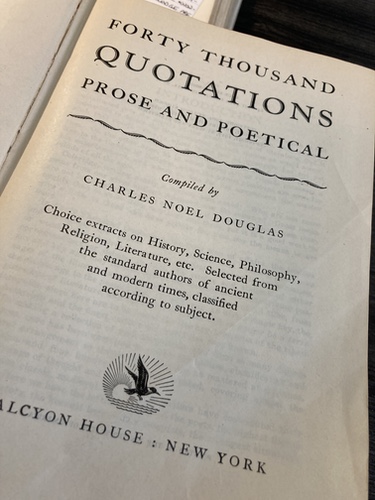One of my recent acquisitions is this door-stop of a volume, Forty Thousand Quotations Prose and Poetical, published in 1940. Several thoughts spring to mind at this point:
Obviously, this book is 80 years old. Wait, no, that was not obvious to me. I was thinking, “1940… Wow, that’s like 60 years ago,” followed not as quickly as it should have been by, “…no wait, that’s 80 years ago.” So the first thought I’ll share here is that the years pile on like onion-skin pages. Year after year after year after year and before you realize it: Door stop. (Both you have a door stop, and you are a door stop.)
Upon arrival I immediately flipped through it to see what I’d gotten for my $14-plus-shipping. The book says, “prose and poetical,” but I don’t know diddly-squat about this Douglas fellow. There could be forty thousand stinkers better left forgotten. My verdict: The density is low. Perhaps 1 in 4 strike me as even worthy of inclusion in the book. Still, ten thousand quotations prose and poetical are worth 2/10 of one cent each, (in my book.)
It’s said—I’ve heard it said, I’ve said it myself now many times—that our favorite quotations say more about ourselves than of those we’ve quoted.
Is this book a snapshot of 1930’s America? Let this sink in: There’s not a single quote from anyone related in any way to World War II. There isn’t a single modern tech genius in here either. But wait! It was printed in 1940, yes. However the copyrights are 1904, 1914 and 1917. This book is a time machine come to me across more than a century.
I generally give books the page 88 test. That’s laughably near the front of a book which has— (Wait, wat?! This book has exactly 2,000 numbered pages! That’s another tangent I’m not following. Ahem.) Page 88 is laughably near the front of a 2,000 page book. As I carefully flipped towards 88, I was briefly anxious when I thought the entries under “anxiety” might run to page 88, but fortunately, no. The two columns of page 88 cover the tail end of, Apothegm (“a short, pithy and instructive saying or formulation,” honestly, I had to look that up,) then Apparel, and then Apparitions runs onward to page 89.
The first full entry on page 88 is:
A few words worthy to be remembered suffice to give an idea of a great mind. There are single thoughts that contain the essence of a whole volume, single sentences that have the beauties of a large work, a simplicity so finished and so perfect that it equals in merit and in excellence a large and glorious composition.
~ Joubert
ɕ

